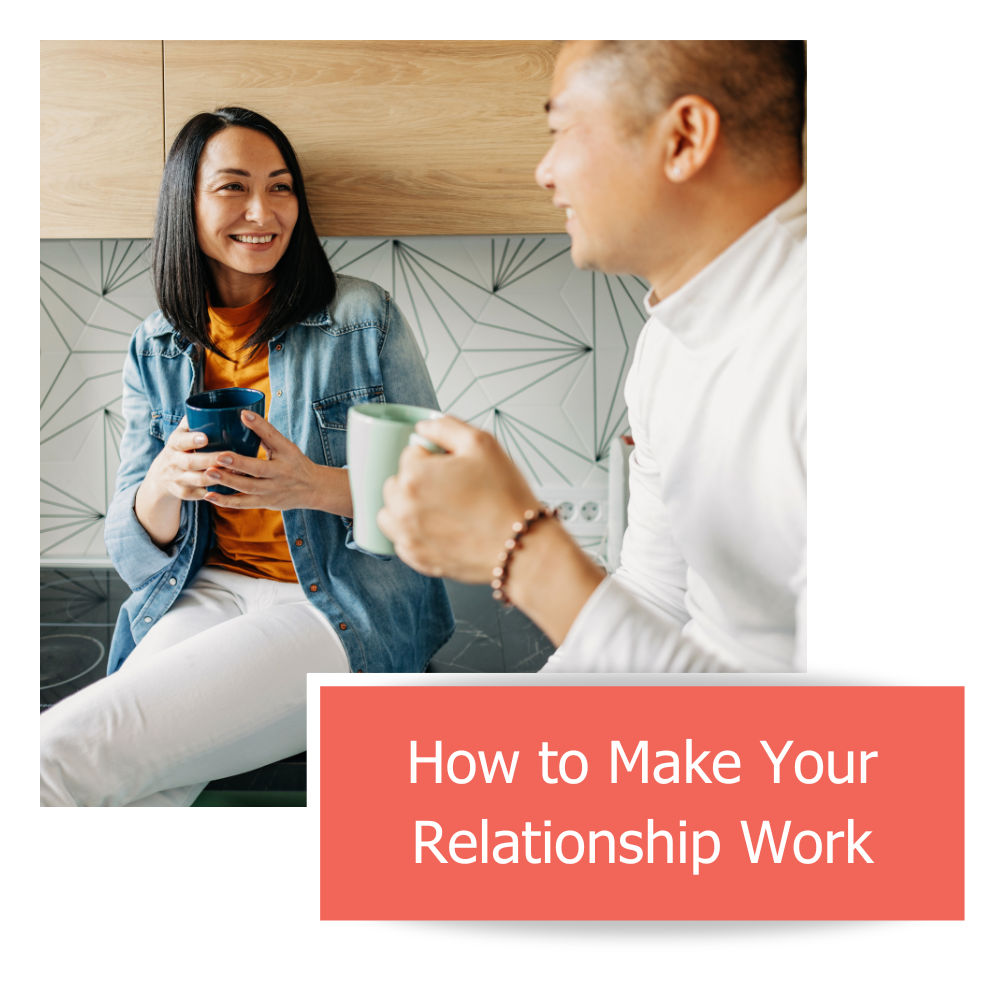Understanding Emotional Intelligence
What is emotional intelligence in the first place?
Emotional intelligence (EQ) in relationships is being able to recognize, understand, and manage your own emotions, and to attune to your partner’s emotions. It’s not just about staying calm or being a “good communicator.” This is about noticing what you’re feeling, making space for your partner’s experience, and navigating emotional moments with care and intention. When couples build emotional intelligence together, they tend to communicate more openly, to trust more deeply, and to stay more connected emotionally, especially when life gets hard.
Why emotional intelligence matters in our relationships
Every couple goes through rough patches, yet what sets strong relationships apart isn’t the absence of conflict, but how couples handle those moments. Emotional intelligence can mean the difference between getting stuck in frustrating patterns that leave you feeling lonely or working through challenges together. When both people can manage their emotions (enough), show empathy, and communicate clearly, conflict becomes easier to
navigate, and love grows more resilient over time.
Dr. Shirley Glass is a respected psychologist who studied emotional and physical boundaries in relationships,
and she emphasized how emotional disconnection often comes before infidelity. Her important work showed
that when couples lose their emotional connection, the relationship becomes more vulnerable to outside threats. Building emotional intelligence helps keep that connection strong by deepening trust and creating a
stronger foundation.
If you and your partner already have a pretty solid level of emotional intelligence, you might notice that you:
– Can get through disagreements without lashing out or shutting down
– Show up for each other emotionally, especially during stressful times (when we most need it!)
– Express your feelings in ways that feel constructive and respectful
– Understand your partner’s emotional needs without always needing them spelled out
– Stay curious and open-minded, even when things get tense
How to develop emotional intelligence in your relationship
Not everyone is naturally high in EQ, but that’s perfectly okay! Luckily, emotional intelligence isn’t a fixed trait…it’s a skill that can be strengthened with practice. The good news? You and your partner can work on this together in ways that are practical, meaningful, and sometimes even fun.
Simple Practices to Strengthen EQ
1. Pause and check in with yourself
Before reacting to something your partner says or does, take a breath and ask yourself, What am I feeling right now? Naming your own emotions gives you a better chance of responding thoughtfully instead of reacting out of habit.
2. Listen to understand, not to defend
When your partner’s talking, hold off on jumping in with advice or counterpoints. Try to really hear them. Ask clarifying questions. Reflect back what you’ve heard. Being fully present makes your partner feel seen, and
builds trust over time.
3. Validate before problem-solving
Sometimes (often times) your partner doesn’t want a solution…they just want to feel heard. A simple “That
sounds really hard. I’d feel overwhelmed too” can be more powerful than any fix-it plan.
4. Take breaks when emotions run high
If a conversation starts to escalate, it’s okay to take a timeout. Not just okay, but recommended. A short pause,
even for ten minutes, can help both of you regroup and return to the conversation with more clarity and calm.
Just also be ready for you or your partner needing more than ten minutes for that break, which is fine too.
A Gottman-Inspired Tool: Emotion Coaching Conversations
Dr. John Gottman’s research has shown that emotional attunement—being present and responsive to your
partner’s emotions—is key to long-lasting connection. One way to build that attunement is through something
that we could call an “emotion coaching conversation”.
Here’s how to try it:
– Pick a calm, low-stress moment (not during or right after an argument)
– Take turns sharing a recent emotional experience
– The listener reflects back: “It sounds like you felt ___ when that happened”
– Validate their feelings: “That totally makes sense—I’d feel that way, too” *If it doesn’t make sense, that’s fine,
just ask your partner questions about their experience so that you can eventually genuinely validate their
emotional experience
– Offer comfort instead of solutions. Just being emotionally available is often enough.
– Switch roles
Doing this regularly helps you both feel more supported and understood. Over time, these small moments can
create a much deeper emotional bond.
What Happens When Emotional Intelligence Is Low?
When EQ is underdeveloped in a relationship, things can feel confusing and disconnected. Misunderstandings build up, resentment fester, and conflicts often feel more like battles than conversations.
Some common signs that emotional intelligence needs work include:
– Getting defensive easily or struggling to take feedback
– Difficulty putting emotions into words
– Dismissing or minimizing each other’s feelings
– Withdrawing or lashing out during tense moments
How to Start Improving Emotional Intelligence Together
If you’re noticing some of these patterns in your relationship, take heart—this is something you can work on.
Here are a few helpful starting points:
– Cultivate self-awareness: Notice how your own emotions show up and affect your reactions
– Practice empathy: Challenge yourself to see things through your partner’s eyes
– Strengthen conflict skills: Try to stay focused on resolving the issue, not pointing blame
– Seek outside support if needed: A couples therapist can help
Real-Life Example: Alex and Jordan’s Story
Alex and Jordan had been together for six years, but their arguments were starting to wear them down. Alex
often felt ignored, while Jordan felt like Alex was too emotional. Most disagreements ended in someone walking away, frustrated and hurt.
With help from a therapist around emotional intelligence, they were able to make changes. They started using emotion coaching conversations, pressed pause when tensions rose, and made more of an effort to validate each other’s feelings. At first it felt clunky and they each complained of being asked to talk like a therapist. Alex was used to venting quickly, while Jordan’s instinct was to shut down.
But little by little some things shifted, as evidenced by a night where Alex came home exhausted after a tough day at work. Normally Jordan would offer a quick fix, but this time he listened and said something like, “That sounds like a really heavy day. No wonder you’re feeling overwhelmed.” That was it…that’s all he needed to say! Alex teared up…not from sadness, but from finally feeling understood.
It was a small exchange, but it cracked something open for these two. Their conversations began to feel less like a tug-of-war and more like mutual support. Arguments didn’t disappear, but they became more manageable, and certainly much less painful. Emotional intelligence didn’t fix everything, but it gave them the
tools to show up differently for each other more often.
Final Thoughts
Emotional intelligence isn’t a magic cure-all, but it’s one of the most powerful tools we have for building a
thriving relationship. When you and your partner prioritize empathy, self-awareness, and emotional
attunement, you give your relationship the room it needs to grow and deepen. These skills aren’t always easy,
but they’re learnable, and are absolutely worth the effort. A few small changes can go a long way in creating a
more connected, loving partnership.
Emotionally Intelligent Relationships: FAQs
How does emotional intelligence affect relationships?
Emotional intelligence plays a huge role in how couples connect, communicate, and handle conflict. When both
partners can express their emotions clearly, listen with empathy, and regulate their reactions, they’re better
equipped to move through tough moments together. It helps build trust and keeps the emotional connection
strong. On the other hand, when emotional intelligence is low, miscommunication and emotional distance tend
to pile up, making the relationship feel tense or unbalanced, and most likely resentful. Prioritizing EQ creates a space where both people feel seen, heard, and supported, which goes a long way toward creating the lifelong
relationship most of us are seeking.
What are the signs of high emotional intelligence in a partner?
A partner with high EQ tends to be self-aware, open-hearted, and intentional with their communication. They
listen without rushing to fix things, take your emotions seriously, and share their own feelings in ways that feel
constructive rather than overwhelming. You might notice that they stay fairly calm under pressure, try to
understand your point of view even when it’s hard, and genuinely care about growing both as an individual and
as part of the relationship. It’s less about being perfect, and more about showing up with curiosity and care. It’s
also about taking responsibility for your emotions, as they really are yours to own.
How can emotional intelligence be developed?
Like meaningful skills of just about any kind, emotional intelligence takes practice. It starts with slowing down
and tuning in to your own emotional patterns…being able to name what you’re feeling and why. What are you
experiencing in your body? What word seems to fit for the state you’re in right now? From there, practicing
active listening, pausing before reacting, and learning to validate your partner’s emotions (“your emotions
make sense to me, even though mine might be different”) all help build connection. Regular emotional check-
ins that are simple, honest conversations about how you’re both doing can go a long way. These habits may feel small, but over time they lead to stronger emotional resilience and intimacy that will be worth the effort.
What are effective communication techniques in relationships?
Good communication isn’t about saying the “right” thing…it’s about creating space for honest, respectful connection. Try using “I” statements to express how you feel without placing blame (like, “I feel hurt when…”).
Make sure to reflect back what your partner is saying so they feel truly heard, and respond with empathy rather than jumping straight to problem-solving. Don’t underestimate nonverbal communication! Your tone, facial
expressions, and body language speak volumes. Your partner can instinctively tell when you’re being open to them and curious about them, so practice stepping into that connected mindset and body state.








